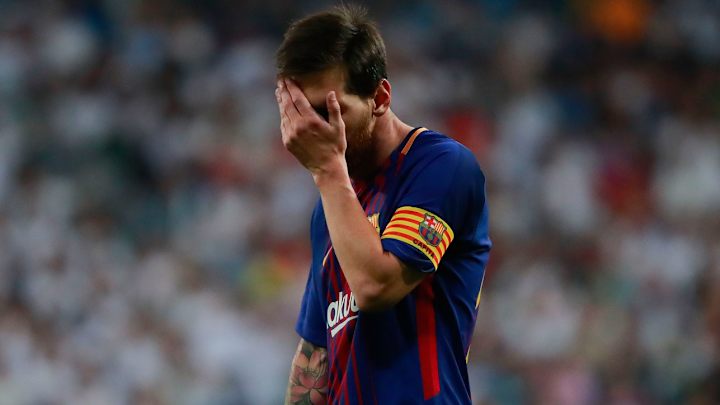Barcelona's Problems Go Way Deeper Than Neymar's Surprise Transfer

Neymar is gone and all the money in the world–or at least not €222 million–can fill the hole he has left at Barcelona.
Great teams, great eras, rarely end well. The process of rejuvenation, of replacing fading stars and integrating new ones, is never straightforward, but the departure of Neymar has brutally exposed the flaws at Barcelona. In one sense the 5-1 aggregate defeat to Real Madrid in the Super Cup means little–it was only the Super Cup–but in another it means everything: Barça was abject, disjointed and disinterested, so meek that even a red card and five-match ban for Cristiano Ronaldo and another injury sustained by Gareth Bale didn’t impinge on the general conclusion that this season looks like being a procession for Madrid.
It might be the departure of Neymar that has highlighted the incipient crisis, but of everything that’s going wrong at Barça, it’s the one aspect for which it cannot really be blamed. When that release clause was set, who really believed that any club would be able to match it? Who did not think that Neymar was effectively locked in at Barcelona for the remainder of his contract? Last season, especially in that 6-1 second leg win over PSG, there were signs that Neymar was beginning to emerge from Lionel Messi’s shadow, that he would soon become Barcelona’s key player. He is five years younger than the Argentinian: this, it seemed, was ideal transition planning. To lose him because another club decided to double the world transfer record was, if not unforeseeable, then at least low probability.
Neymar's Transfer from Barcelona to PSG Defies Belief on All Levels
But for other issues, Barcelona is culpable. What it had under Pep Guardiola was extraordinary and, perhaps, unrepeatable: a brilliant young coach with a brilliant generation of players emerging from La Masia already schooled in the basic principles of the philosophy he wanted to put into practice. When that generation began to fade–Xavi has gone, Andres Iniesta and Sergio Busquets are failing, even Messi, at 30, is perhaps not quite the irresistible force he once was–transition was always going to be problematic.
It’s impossible for outsiders to know whether the flow of gifted young players into the first team was slowed through conservatism or necessity. Are there fewer La Masia graduates getting their chance because this generation isn’t as good as the previous one (which would hardly be surprising) or have coaches since Guardiola been less prepared to place their faith in youth?
Either way, there has been a need for signings to fill the gaps, and few of those brought in have adjusted well. Arda Turan and Andre Gomes have been huge disappointments, and the danger now is that Barcelona throws good money after bad. Cash rich and stung by the loss of Neymar, the temptation is inevitably to make a huge signing almost as compensation. Yet the truth is that there isn’t another Neymar waiting to be signed. Philippe Coutinho and Ousmane Dembele, fine young talents that they are, are not yet at Neymar’s level, nor should they be expected to be. Yet inevitably whoever comes in as a result of the Neymar cash will be expected to replace him, which is a terrible and possibly inhibiting burden to have to bear.
Don't Be So Quick to Judge Paulinho's Scrutinized, Controversial Barcelona Transfer
In other circumstances, picking up Gerard Deulofeu, Paulinho and Nelson Semedo would have been seen as canny summer business, strengthening in areas where Barcelona needed strengthening. As it is, those three signings feel anti-climactic, leading to the widespread mockery of Paulinho on social media, despite his exceptional recent form for the Brazil national side.
And because troubles have a habit of arriving in battalions and because Barcelona is Barceona and so riven by political infighting, the mess is far more complex than that. Luis Suarez will miss at least a month with a knee injury, meaning Barcelona will start the season with only one component of the fabled MSN forward line. Gerard Pique and general manager Pep Segura have been publicly exchanging barbs over the past few days. Fans called on Wednesday for the president Josep Maria Bartomeu to resign; Joan Laporta, who was in charge in the Guardiola days, could make a comeback.
Messi is reported to be furious at the mess and has not yet signed his new contract, although it is agreed in principle. Meanwhile, there are rumors that an attempt to sign central defender Inigo Martinez from Real Sociedad was vetoed by the dressing room because it was feared it would compromise the role of the popular and influential Javier Mascherano.
Young Star Marco Asensio Proving his Real Madrid Rise is Inevitable
Into the chaos walks Ernesto Valverde, who played at Barcelona in the late 1980s under Johan Cruyff. In happier times, he might have been seen as a continuity candidate to replace Luis Enrique, somebody who could ensure things were still done the right way. As it is, the fear is that he will not be able to impose himself and will be crushed by the competing factions.
It’s a mess from top to bottom and what makes it worse for Barcelona is that Madrid, having largely abandoned the Galacticos policy to sign gifted young Spanish players, looks as imposing and serene as it has for well over a decade.
For Barcelona, this could be a long and bloody season.

An accomplished author of multiple books, Jonathan Wilson is one of the world’s preeminent minds on soccer tactics and history.